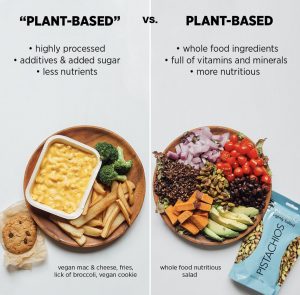What Athletes Say About Recovering on a Plant Based Beef Diet
What Athletes Say About Recovering on a Plant Based Beef Diet
Blog Article
All About Healthy Food: Benefits of Embracing Plant Based Options
The discussion surrounding plant-based diets has obtained significant attention over the last few years. Several people are checking out the prospective health and wellness benefits, dietary advantages, and ecological effects linked with these dietary options. As people come to be more knowledgeable about their food's influence on health and sustainability, inquiries develop concerning the usefulness of embracing such a lifestyle. What specific adjustments can one anticipate, and exactly how might these choices improve not just personal health yet likewise the planet's future?
Understanding Plant-Based Diet Regimens
Although several people connect plant-based diet plans mainly with vegetarianism or veganism, these diets can encompass a vast variety of consuming patterns that focus on whole, minimally refined plant foods. Such diets usually include fruits, veggies, entire grains, vegetables, seeds, and nuts, while limiting or removing pet products. This versatility allows individuals to tailor their nutritional options according to nutritional requirements and individual choices. Some might embrace a primarily plant-based diet regimen while still occasionally consuming meat or milk, commonly referred to as a flexitarian technique. The focus stays on integrating even more plant foods, which can cause a varied array of tastes and dishes. Recognizing these various interpretations of plant-based consuming is necessary for valuing its ease of access and charm in modern food culture.
Health And Wellness Perks of Plant-Based Foods
The wellness advantages of plant-based foods are considerable, providing a nutrient thickness benefit that sustains general health. Study shows that these foods can improve heart health and play a necessary duty in effective weight management. By incorporating much more plant-based alternatives, people might improve their nutritional selections and advertise lasting wellness.
Nutrient Thickness Benefit
Nutrient thickness plays an essential role in the wellness advantages of plant-based foods, making them a compelling selection for those looking for a well balanced diet. Plant-based foods, such as fruits, vegetables, beans, nuts, and whole grains, are commonly rich in important vitamins, minerals, and antioxidants while being reduced in calories. This high nutrient density enables individuals to consume less calories while still satisfying their dietary demands. Furthermore, these foods are packed with dietary fiber, promoting gastrointestinal health and assisting in weight monitoring. By including nutrient-dense plant-based alternatives, customers can enhance their general health, support their immune systems, and lower the danger of chronic diseases. Ultimately, the nutrient thickness of plant-based foods highlights their importance in a health-conscious lifestyle.
Heart Health Renovation

Weight Management Assistance
In addition to advertising heart health and wellness, a plant-based diet plan can considerably assist in weight administration. This dietary approach emphasizes entire foods such as fruits, vegetables, beans, nuts, and whole grains, which are generally lower in calories and greater in fiber compared to animal-based products. The high fiber web content assists raise satiety, decreasing overall calorie consumption. Furthermore, plant-based diet regimens are frequently rich in crucial nutrients while low in harmful fats, making it simpler to keep a healthy and balanced weight. Plant Based Beef. Research study shows that people that adopt a plant-based way of life often tend to have lower body mass indexes (BMIs) and experience more effective weight reduction contrasted to those that eat meat-heavy diets. Welcoming plant-based options is a critical choice for effective weight management.
Nutritional Worth of Plant-Based Ingredients
Plant-based active ingredients are abundant in vital nutrients, providing a varied range of vitamins, minerals, and antioxidants that add to general health. A comparison of healthy protein sources reveals that while animal items are usually deemed superior, several plant-based options give sufficient healthy protein and other valuable compounds. original site Understanding the dietary worth of these ingredients can help individuals make notified dietary selections.
Vital Nutrients in Plants
Nutrient-rich components found in plants supply a varied variety of crucial vitamins and minerals that add greatly to overall wellness. These active ingredients are abundant in vitamins A, C, and K, which support immune function, vision, and blood clotting, specifically. In enhancement, plants offer vital minerals such as calcium, magnesium, and potassium, crucial for heart wellness, muscle mass feature, and bone toughness. The existence of fiber in plant-based foods aids food digestion and promotes a healthy gut microbiome. Antioxidants, located generously in veggies and fruits, help fight oxidative anxiety and decrease swelling. Lots of plant foods are reduced in calories yet high in nutrients, making them an outstanding selection for those looking for to keep a healthy weight while making certain perfect nutrient consumption.

Comparing Healthy Protein Resources
Healthy protein sources vary substantially in their nutritional profiles, with plant-based ingredients offering one-of-a-kind benefits. Unlike pet healthy proteins, which usually have hydrogenated fats and cholesterol, plant proteins often tend to be reduced in these unhealthy parts. Legumes, nuts, seeds, and entire grains are rich in necessary amino acids, fiber, vitamins, and minerals. For circumstances, lentils offer high protein web content together with substantial iron and folate, while quinoa is a full protein, offering all 9 important amino acids. Furthermore, plant-based proteins are often gone along with by antioxidants and phytochemicals that sustain total wellness. The change to plant-based protein resources not only enhances dietary intake yet also straightens with lasting dietary techniques, decreasing environmental effect and promoting lasting health and wellness advantages.
Environmental Impact of Plant-Based Consuming
As awareness of environment adjustment grows, several people are discovering sustainable nutritional selections that can significantly lessen their ecological impact. Plant-based consuming has become a significant factor to reducing greenhouse gas emissions, which are mainly connected with animals production. The growing of fruits, veggies, beans, and grains commonly requires fewer sources, such as water and land, compared to animal farming. Additionally, plant-based diet plans can cause lowered deforestation, as less land is needed for grazing livestock or growing animal feed. By changing in the direction of plant-based find more info alternatives, customers can sustain biodiversity and advertise much healthier communities. Overall, accepting plant-based eating not just advantages personal health and wellness yet additionally stands for a vital action towards environmental sustainability and conservation initiatives.
Conquering Common Misconceptions
While several individuals identify the advantages of a plant-based diet, several misunderstandings often prevent them from completely accepting this lifestyle. A common belief is that plant-based diets lack enough healthy protein; nevertheless, numerous plant resources, such as vegetables, nuts, and tofu, offer sufficient protein. In addition, some think that this diet plan is costly, when as a matter of fact, staples like beans, rice, and seasonal vegetables can be fairly affordable. Another false impression is that plant-based consuming is overly limiting, whereas it really uses a diverse selection of foods and tastes. Many fret that a plant-based diet plan may lead to shortages, yet with appropriate planning, individuals can get all needed nutrients, including minerals and vitamins, while enjoying a vast variety of scrumptious meals. Large Tips for Transitioning to a Plant-Based Lifestyle
Making the change to a plant-based way of life can be an improving experience, though it typically requires some support to navigate the first changes. People are motivated to begin progressively, incorporating more fruits, veggies, legumes, and whole grains into their meals while lowering meat and dairy usage. Dish preparation is important; preparing a regular food selection can help relieve the modification and protect against last-minute unhealthy options. Discovering brand-new recipes and cooking methods can likewise improve the experience and preserve excitement about plant-based eating. Additionally, joining support system or neighborhoods can supply inspiration and share useful pointers. Finally, staying informed about nourishment guarantees balanced meals, preventing deficiencies while fostering a healthy and balanced, gratifying plant-based lifestyle.
Delicious Plant-Based Meal Ideas
Checking out delicious plant-based dish concepts can inspire people to welcome an extra healthy diet regimen. One popular choice is a passionate quinoa salad, including cherry tomatoes, cucumber, and a vibrant lemon-tahini dressing. One more fave is a full-flavored lentil stew, packed with carrots, celery, and great smelling herbs, best for a calming dinner. For breakfast, overnight oats made with almond milk, chia seeds, and covered with fresh berries give a nutritious start to the day. Furthermore, a lively vegetable stir-fry with tofu and a selection of vivid veggies can be a quick yet satisfying meal. Lastly, luscious avocado salute on whole-grain bread, sprinkled with seeds and spices, uses a simple yet tasty snack. These meals showcase the range and richness of plant-based eating.

Regularly Asked Questions
Can a Plant-Based Diet Plan Offer Enough Protein?
The inquiry of whether a plant-based diet regimen can supply sufficient healthy protein is typical. Numerous resources, including beans, nuts, seeds, and whole grains, can fulfill protein requires successfully, supporting a nourishing and well balanced diet regimen for individuals.
Are Plant-Based Diet Regimens Suitable for Kid?
The suitability of plant-based diet plans for children depends on mindful planning. Appropriate nutrients need to be guaranteed, consisting of minerals, vitamins, and proteins. With appropriate assistance, such diets can support healthy growth and growth in children.
Exactly how Do I Eat Out on a Plant-Based Diet regimen?
Eating in restaurants on a plant-based diet plan involves seeking dining establishments with varied menus, requesting alterations, and exploring vegan-friendly choices. Preparation ahead and interacting nutritional choices can enhance the dining experience while keeping dietary options.
What Are Usual Irritants in Plant-Based Foods?
Common allergens in plant-based foods consist of soy, gluten, nuts, and seeds - Plant Based Chicken. People adhering to a plant-based diet regimen should understand these irritants and review tags carefully to avoid unfavorable responses and assure safe consumption
Can Plant-Based Diets Aid With Weight Management?
Study indicates that adopting a plant-based diet may great post to read help with weight-loss due to its commonly reduced calorie thickness and higher fiber material. This combination can enhance satiety, helping people handle their caloric intake efficiently. Several people associate plant-based diets mainly with vegetarianism or veganism, these diets can include a broad range of eating patterns that focus on entire, minimally refined plant foods. Nutrient thickness plays an essential role in the wellness advantages of plant-based foods, making them a compelling choice for those seeking a balanced diet regimen. Plant-based diet regimens have been shown to considerably enhance heart health, as they often have components that support cardiovascular function. In enhancement to advertising heart health, a plant-based diet regimen can substantially assist in weight administration. A common idea is that plant-based diet plans lack sufficient healthy protein; nevertheless, various plant resources, such as vegetables, nuts, and tofu, provide enough healthy protein.
Report this page